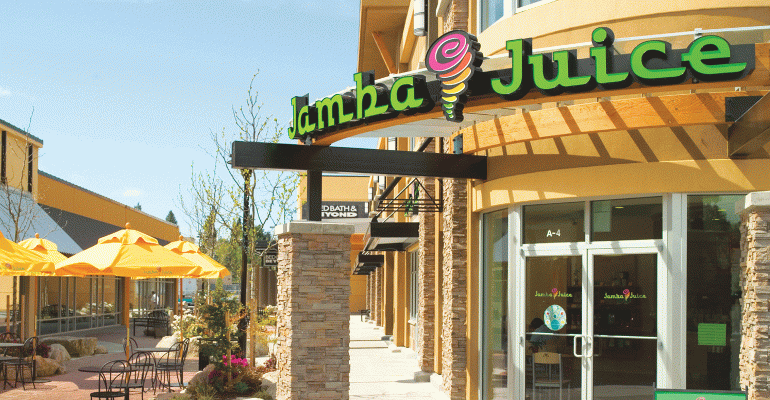Jamba Inc. lowered its expectations for annual sales on Monday, after same-store sales fell in the fourth quarter ended Jan. 3 and bad weather kept sales weak early in 2017.
The company now expects “flat to slightly positive” same-store sales this year, down from an estimate of 2 percent to 4 percent, after same-store sales fell 2.2 percent in the fourth quarter. Jamba also lowered expectations for revenue and new unit openings.
Executives said bad weather in California and other western states hurt sales in January and February, although they said there was “meaningful” improvement in March.
The lowered expectations came as the company said its annual report would be delayed amid major changes in Jamba’s leadership, business model and headquarters.
“It’s unacceptable to delay filing our financials,” Jamba CEO Dave Pace said during the company’s earnings call on Monday. “But we’re in a unique situation. We’ve transitioned our leadership, our strategy and our physical structure. We’ve completed a significant change to our entire structure.”
Jamba’s stock, which is down more than 40 percent over the past two years, was down more than 3 percent Monday on the news.
Pace was hired a year ago as chief executive, unleashing a major shift in the company’s business. Jamba moved its headquarters from Emeryville, Calif., to Frisco, Texas, to lower costs, provide a lower cost of living for workers and offer a more central headquarters for national expansion.
Jamba also turned over much of its management. Last week, the company announced the hiring of a new chief operating officer, Joe Thornton. That follows the hiring of Rachel Phillips-Luther as chief marketing officer last July, and the hiring of Marie Perry as CFO last May. Several other executives have also changed.
Pace said Jamba re-staffed “more than 90 percent” of its leadership and support organization due to the move and the company’s refranchising efforts.
Jamba also made several other changes to its business. It exited its JambaGO platform to focus more on unit growth and development. The company also closed its “Innovation Store” in Pasadena, Calif. Jamba said it expects to record charges of $13 million to $14 million in the fourth quarter in relation to the changes.
Jamba reduced its unit development projections for the year, and expects to open 65 to 75 new locations, 50 of them domestically. But it also expects to close 40 locations in 2017. The company had 909 locations as of Jan. 3.
The company is shifting toward traditional and non-traditional locations, as well as drive-thru units. Jamba said it is de-emphasizing smaller “express” units because they don’t contribute much to the company. Jamba has 47 express locations, after opening 10 units this year.
“It’s not a big format for us,” Pace said, noting that the locations don’t generate much revenue for the company. “I thought it was an insignificant amount relative to what we should be focused on.”
Jamba has high hopes for drive-thru locations. The company has five drive-thru locations that make about triple the revenue of a traditional location without a drive-thru.
Pace said the drive-thru can be a bigger part of the company going forward, and Jamba expects to open six to eight of the locations this year.
“I think Jamba is behind the curve,” he said. “We need to get out there and start securing this real estate more aggressively. Franchisees and customers have just embraced this.”
Jamba opened 75 new units in 2016 and closed 59 locations. That was far below the 95 locations Jamba expected to open. The company restructured its real estate department and reorganized to give it better “visibility” on new unit development.
Jamba is testing some initiatives to boost sales. That includes a 16-unit delivery test in Texas, which could be extended to additional markets in the second quarter. And the company plans to test a “Smoothie Bowl Bar” in the second quarter that could be rolled out systemwide later this year.
Contact Jonathan Maze at [email protected]
Follow him on Twitter: @jonathanmaze





